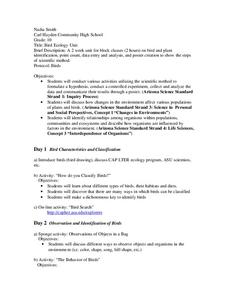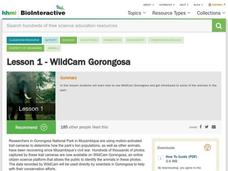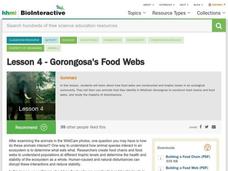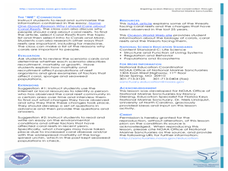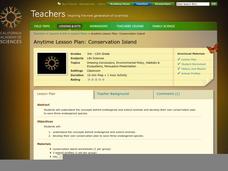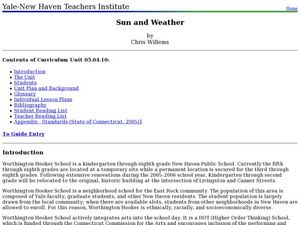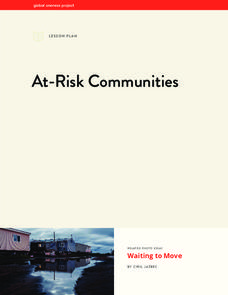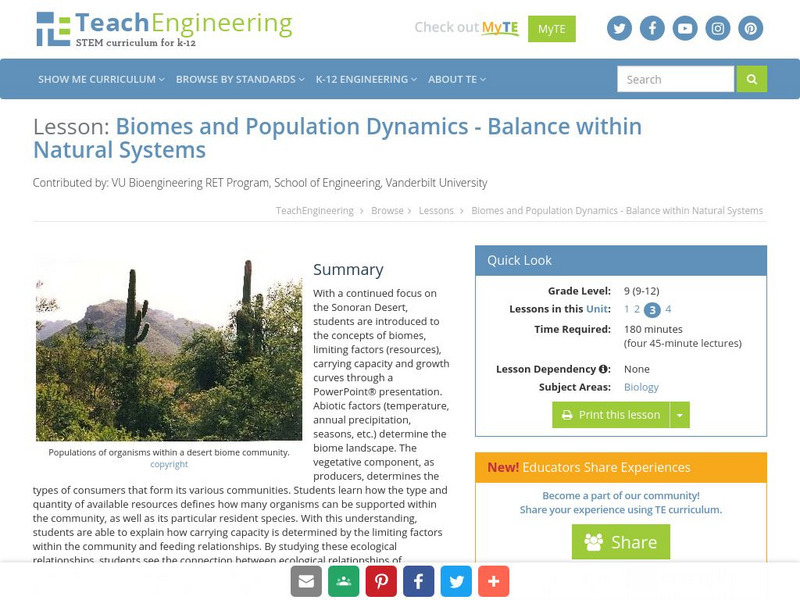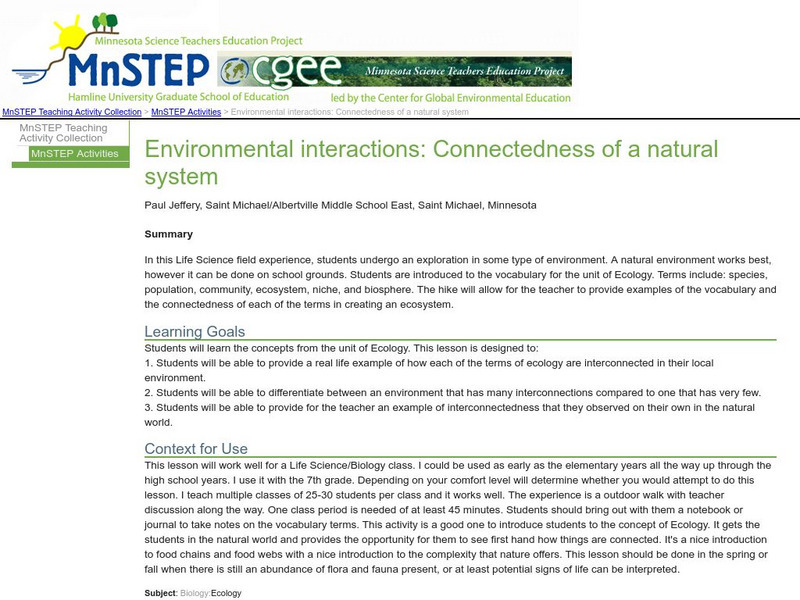Curated OER
Bird Ecology Unit
Tenth graders conduct various activities utilizing the scientific method to formulate a hypothesis, conduct a controlled experiment, collect and analyze the data and communicate their results through a poster. They also identify...
Teach Engineering
Biomes and Population Dynamics - Balance Within Natural Systems
How large can a population become? The fifth installment of a nine-part unit teaches young ecologists about limiting factors that determine the carrying capacity of species in the Sonoran Desert. Here is a PowerPoint to help present this...
Curated OER
Population Growth
Learners grow duckweed, observe what happens when an organism population is allowed to grow without predation or competition, view videos about invasive species, and develop a proposal for controlling the growth of an invasive species in...
Curated OER
Prairie Restoration and Prairie Ecology
Students collect data as they identify and classify native prairie plants and insects. They create their own population study using a variety of sampling techniques to determine the population density of various species. Students...
Curated OER
Exploring Arizona's Biotic Communities Lesson 1: Mapping Biotic Communities
As part of a unit on Arizona's biotic communities, young ecology learners create a map. They describe how humans and animals adapt in their habitat. They take notes and create graphic organizers from articles they read. Beautiful maps,...
Chicago Botanic Garden
Leaf Litter Ecology Lab
Some organisms spend their entire lives in leaf litter. The third in a series of six is a great instructional activity exploring the community of leaf litter. Groups gather and then spread leaf litter over white paper and remove...
Howard Hughes Medical Institute
Lesson 1: WildCam Gorongosa
Take a walk on the wild side! Episode one of an eight-part series of interactive lessons regarding Gorongosa National Park invites learners to become a part of the citizen science community. Scholars read a brief overview of the trail...
Howard Hughes Medical Institute
Lesson 4: Gorongosa's Food Webs
Who eats who in the savannas of Africa? Explore trophic levels with part four of an eight-part series of lessons focused around Gorongosa National Park. After young explorers identify animals using trailcam images, they construct a food...
Curated OER
Down, Dung and Dirty
Students observe the changes seen in succession and the biodiversity of a community through its species richness and evenness. They create a dung culture in a clear plastic cup from horse, goat or cow dung then observe the numbers of...
Curated OER
Machines: Designing Form and Function
Students design a boat model with simplified steam engine. For this ecology lesson, students compare renewable and nonrenewable energy sources. They determine the efficiency of their boat model.
Curated OER
Teaching Kids about the Environment
Fifth graders identify the species of plants and animals found in an environment. They compare these findings to plant and animal species found in an unlike environment. Students acquire and compare soil samples from the two sites chosen.
Curated OER
Water, Water Everywhere and Not a Drop to Drink
Students identify the different stages in the water cycle. In this environmental science lesson, students research about different water pollutants in watershed. They describe ways to purify water.
Energy for Keeps
Renewable Energy Action Project: What's in Your Energy Portfolio?
Uncover the renewable energy potential in your region. The activity outlines an approach to research current practices and trends. Learners conduct surveys to assess the attitudes of the local population and prepare a paper summarizing...
Virginia Department of Education
Ecosystem Dynamics
Searching for an eccentric way to enhance lessons on ecosystems while ensuring pupils remain creative and motivated? Upon viewing The Lorax by Dr. Seuss, designated groups design and construct a pop-up book that...
Curated OER
The Changing Coral Reef
Students record changes in the composition of a coral reef. In this Coral Reef lesson plan, students recognize the needs of Coral Reef species to survive. Students chart changes in population over time. Students write an...
Curated OER
Ecosystem Interdependence
Students outline a scenario demonstrating ecosystem interdependence. They explain the effects of this change according to the food web. They give a positive example such as increased rain and have the students call out answers to your...
Curated OER
Pharaoh Mountain Hike: Investigating Adirondack Life Zones
Students hike a local mountain and examine its life zones. They measure various components at each zone and collect leaf litter at the sites. At the mountain top, students make descriptive observations and complete a handout about the...
California Academy of Science
Conservation Island
Why not walk in the footsteps of Teddy Roosevelt and become a conservationist? After discussing issues and reasons for animal extinction, the class creates their own conservation plans. Each small group is given mock data regarding a...
Curated OER
Sun and Weather
How is the Earth's weather created? Middle schoolers will explain how the Sun's energy is transformed into different forms. They will perform mathematical calculations of volume, mass, and temperature. They they will explain the...
Global Oneness Project
At-Risk Communities
"Waiting to Move," a photo essay by Ciril Jazbec, brings into sharp focus the threats posed by climate change. Class members examine images of Shishmaref Island and the Native Alaskan Inupiate coastal villages that are impacted by rising...
Curated OER
Praire Biome Models
Fifth graders, in groups, list the physical characteristics of a biome and think of ways in which animals might have to adapt to live there and make a biome mobile ball that show the different types of habitats that shape the praire biome.
Curated OER
Biomimicry, Nature: Architecture of the Future
Students explore the relationship between nature and architecture. In this cross curriculum history, culture, and architecture lesson, students observe and discuss structures visible in nature. Students view websites in which Native...
TeachEngineering
Teach Engineering: Biomes and Population Dynamics
This lesson begins with a PowerPoint slideshow that covers important ecological concepts about biomes, limiting factors, carrying capacity, and population growth. Students will look at the population dynamics involved with the diversity...
Science Education Resource Center at Carleton College
Serc: Environmental Interactions: Connectedness of a Natural System
A field experience where students undergo an exploration in a natural environment. They are introduced to the concepts of species, population, community, ecosystem, niche, and biosphere.
